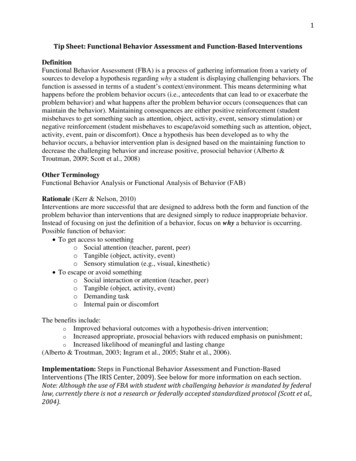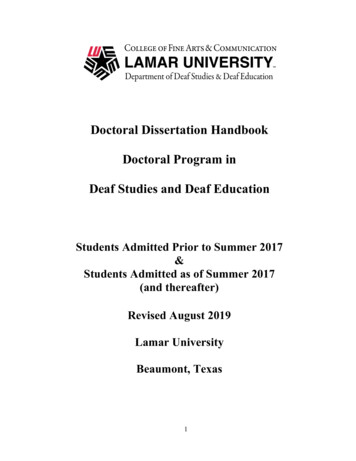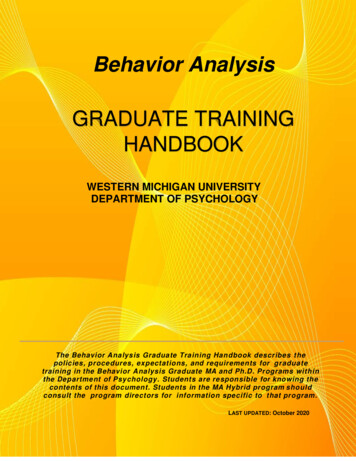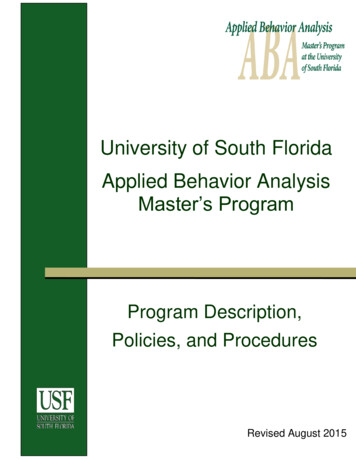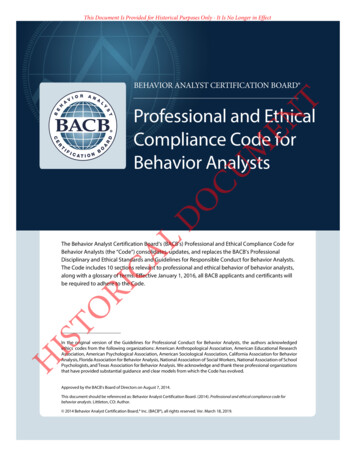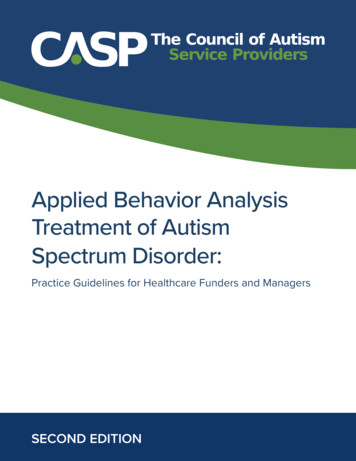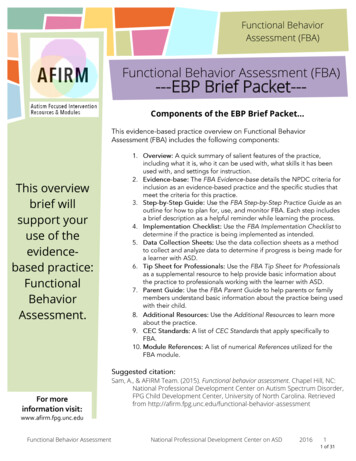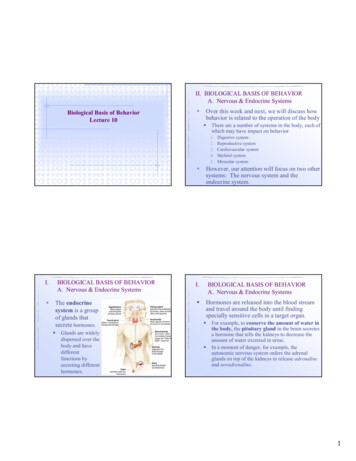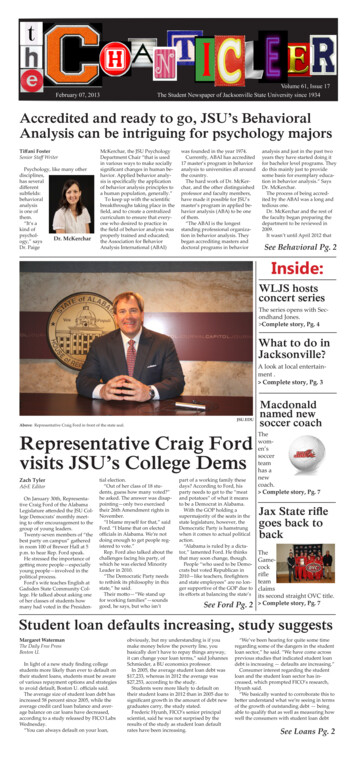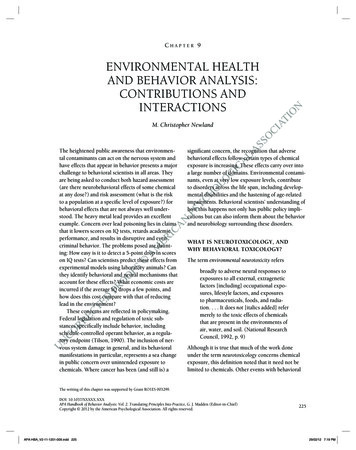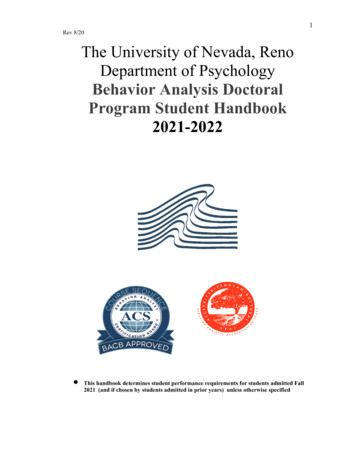
Transcription
Rev 8/20The University of Nevada, RenoDepartment of PsychologyBehavior Analysis DoctoralProgram Student Handbook2021-2022 This handbook determines student performance requirements for students admitted Fall2021 (and if chosen by students admitted in prior years) unless otherwise specified1
2Rev 8/20DEPARTMENT OF PSYCHOLOGYThe University of Nevada, Reno is a fully accredited, doctoral degree grantinginstitution, serving over 20,000 students in 30 graduate and 70 undergraduate degreeprograms. The Department of Psychology is made up of three doctoral degree programs,including an APA accredited Clinical Program, the Cognitive & Brain Sciences programand the Association for Behavior Analysis International (ABAI) accredited BehaviorAnalysis Program. The Cognitive & Brain Sciences program and Behavior AnalysisProgram also offer Master’s degrees. There are 31 faculty members in the Department,and approximately 1200 undergraduate majors and 130 graduate students in the variousDepartment programs. An additional number of students are enrolled in SatelliteMaster’s degree programs in Behavior Analysis in the United States and elsewhere. TheMaster’s degree programs in Behavior Analysis are also accredited by ABAI.BEHAVIOR ANALYSIS PROGRAMBehavior Analysis is a sub-division of the discipline of Psychology, distinguishedby a unique philosophical, theoretical, and methodological orientation. The philosophicalorientation is one of naturalistic monism. Historical and contextually-situated behaviorenvironment relations constitute its subject matter. Its method is experimental, with aimsof description, prediction, and control of its subject matter. It has also a distinctive, widelyapplicable, and effective technology.MISSION STATEMENTThe mission of the Behavior Analysis Program at the University of Nevada, Reno,is to strengthen Behavior Analysis as a scientific discipline and as a professionaloccupation.Program GoalsThe Behavior Analysis Program is committed to academic and financial success. It is thetop priority and thus the first goal:Goal 1: To assure the success of the Behavior Analysis Program.Some of the means by which this goal may be accomplished include engenderingsupport for the program from the university, securing additional faculty positions andgraduate assistantships, providing service to the university through committee work, andsupplying outreach to the community.Strengthening the discipline and profession of Behavior Analysis entails operatingin such a manner as to demonstrate continuous improvement in the program’seffectiveness in achieving success. Hence, the second goal:
3Rev 8/20Goal 2: To demonstrate continuous improvement in program outcomes indicativeof the accomplishment of its mission.The means by which we may accomplish this goal is to articulate, implement,monitor, evaluate and modify our practices based on continuously collected data. Theprogram operates in accordance with an ongoing Program Evaluation System for thispurpose.To accomplish these first two goals, it is necessary to enlist the participation of allprogram members and to do so in such a way as to foster enthusiasm and collegiality.Hence, the third goal:Goal 3: To engage all program participants in a genuine partnership, dedicated tothe achievement of the program’s mission.Some of the means by which this goal is accomplished includes involving allprogram members in program governance, operating in accordance with open-bookfinancial management practices, and working toward improved program evaluationoutcomes.Program ObjectivesOur objective for the program is to provide comprehensive training in behavioranalysis, out of which more specialized basic, applied and theoretical interests in behavioranalysis may be developed. A balance of basic, conceptual, and applied training is sought.More specifically, the objectives of the Behavior Analysis Program are: To preserve the accumulated knowledge of behavior science by imparting it toothers.To develop the science of behavior through the production of new knowledge.To contribute to the betterment of society by the application of this knowledge.To assure the viability of the profession through participation in its governance.PROGRAM ADMINISTRATION AND MANAGEMENTProgram DirectorThe Behavior Analysis Program is administered by a Program Director, currentlyDr. Ramona Houmanfar, who reports to the Chair of the Psychology Department and servesas a member of the Department’s Executive Committee. The Program Director providesleadership to the Program in the accomplishment of its mission and objectives.Behavior Analysis Training CommitteeThe Behavior Analysis Training Committee (BATC) is the policy and decisionmaking body for the Behavior Analysis Program. The BATC is chaired by the ProgramDirector, and is composed of all behavior analysis faculty plus two elected studentrepresentatives, one from each degree program. The Financial Officer is an ex-officio
Rev 8/204member of the BATC. The operations of the Behavior Analysis Program are managed byway of a number of standing and ad hoc committees, including Courses and Curriculum,Admissions, Marketing, Admissions, and Program Quality Assurance, among others, asneeded.Administrative AssistantThe financial operations of the Program are managed by the AdministrativeAssistant, who reports to the Program Director (Ramona Houmanfar). This person managesthe BA office, and provides assistance associated with management of academic operationssuch as graduate admissions process, and acts in an advisory capacity to the BATC.FacultyThe Behavior Analysis faculty presently consists of six core members, including:Bethany Contreras, Linda Hayes, Steve Hayes, Ramona Houmanfar, Matthew Lewon andMatthew Locey. Patrick Ghezzi and Larry Williams serve as emeritus faculty.The Behavior Analysis Program is program -based, meaning that the facultymembers are available to advise the students in their respective labs on matters related totheir education and training. Faculty serve as models in this regard for scholarship,professionalism, citizenship, and stewards of our science and its institutions.StudentsWe seek students who are committed to a behavioral orientation in psychology,who show research and scholarly potential as teachers, scientists, and practitioners. Wevalue both ability and accomplishment in our selection process and in our continuingsupport for our students. We work closely together, and it is thereby important to us thatstudents fit in well with the group, both intellectually and personally.Students are expected to function independently, to take the initiative in developingresearch plans, and to assume appropriate responsibility for the direction and specific goalsof their learning experiences. Students are expected to schedule and manage their timeeffectively. The first two years of the program are much more structured than the laterones, as students are expected to complete most of the required courses during these years.It is important that classes and exams be completed on schedule, making it necessary forstudents to take required classes when they are offered. Students are expected to devotethemselves to their studies full time, including summers.We also believe students learn a great deal from each other. Consequently, weseek a heterogeneous student population of younger and older students, with gender, racial,and cultural diversity.Preparation for Graduate StudyIt is expected that graduate students enrolling in the program have solid
Rev 8/205backgrounds in psychology. If a deficiency is noted, students are required to eliminatethe deficiency, either by taking courses or through other suitable means. In any case,students should indicate in a written proposal to the BATC how they plan to meet aparticular deficiency. The program consists of course work, research, and practicaltraining. These activities are described in detail below.Didactic CurriculumThe didactic curriculum includes 48 credits: 9 credits in methods, 3 credits inethics, 3 elective credits (in addition to summer seminars), and 23 other credits inbehavior analysis (including 3 summer seminars), as shown on page 17.PRACTICAL TRAININGAim and PurposeThe purpose of the Practica is to provide practical training to graduate studentsunder the supervision of faculty members. These experiences are of different sorts and arearranged in part to support students’ career interests and in part to broaden their interests.Placements and ProceduresThe doctoral curriculum includes 6 credits of practical training which is normallycompleted during the first two years of study. Practicum experiences may involve clinical,educational or organizational services, program development, research and/or teaching.Placements are arranged and assigned by the student’s advisor(s) in consultation with theBATC.Three credits of practicum are equivalent to 150 hours of work, or 10 hour perweek for 15 weeks. Students are required to log their time and activities and to make thesedata available to their practicum supervisors on a weekly basis. Practicum supervisors areresponsible for specifying student's responsibilities, signing their logs, and for guiding,monitoring and evaluating students’ performance. If the student does not log 150 hoursby the end of the semester, they will receive a grade of “Incomplete” and will be requiredto finish the remaining hours during the subsequent semester.
6Rev 8/20COMPREHENSIVE EXAMINATIONSThe present policy with respect to comprehensive examinations applies to allstudents admitted to the doctoral program in 2005 or later.Aim and PurposeThe comprehensive examinations are aimed at broadening students’ knowledge ofthe science of behavior. All scientific disciplines are comprised of three main subdivisions, namely investigation, interpretation and application, which are unified by andoperate upon a common philosophical foundation. In the science of behavior, these subdivisions are recognized as the experimental analysis of behavior, the conceptual analysisof behavior (i.e., behavior theory and philosophy), and applied behavior analysis.The bounds of these three sub-divisions are not fixed and some overlap amongthem is almost always the case. Nonetheless, scholarly works in the sciences arepartitioned into categories defined by these sub-divisions, as observed in conferenceprogram areas and the contents of scientific journals, for example; and it is assumed thatscholarly work in the science of behavior, including comprehensive exams anddissertations, may be similarly partitioned.Hence, the aim of the comprehensive examinations is achieved by requiringstudents to demonstrate competence in at least one area that is not duplicative of the topicsof their theses, and dissertations or of the sub-divisions into which their dissertations areappropriately partitioned.In short, by way of the two comprehensive exams, thesis and dissertationrequirements combined, students must demonstrate competence in at least two topicalareas (e.g., response variability and substitute stimulation), and within at least two subdivisions of the field (e.g., the experimental analysis of behavior and applied behavioranalysis).Topics and Sub-divisionsThe comprehensive exam in a given sub-division of the field should reflect therelevant curriculum in that sub-division. This is to say, a comprehensive exam in thetheory/philosophy area should reflect materials covered in such courses as RadicalBehaviorism, Behavior Analysis of Language and Cognition, History of Psychology,Relational Frame Theory and Seminar in Psychological Philosophy. This includes theemphasis on conceptual developments and applications in the course on BehavioralSystems Analysis. Similarly, a comprehensive in the basic / experimental area shouldreflect materials covered in such courses as Principles or Behavior, Research Methods andthe Experimental Analysis of Behavior; while those in the applied area should pertain tomaterials covered in such courses as Behavior Assessment, Behavioral Interventions,Behavior Management & Consultation.These curricular specifications should be viewed as general guidelines however asit is possible that materials covered in the theory/philosophy area may give rise to applied
Rev 8/207questions, while basic questions may arise from the materials covered in the appliedcurriculum, and so on. In such cases, it is the student’s responsibility, in consultation withhis/her advisor, to defend the proposal as being representative of comprehensiveknowledge in the relevant sub-division of the field. This is normally achieved byarticulating the aim of the comprehensive in keeping with the characteristics of the relevantsub-division, and including a bibliography reflective of materials pertinent to that subdivision.Demonstration of CompetenceComprehensive knowledge is demonstrated in one or the other of the followingoutcomes: a) two first authored publications; or b) one first authored publication and onegrant proposal.It is assumed that students will collaborate with Behavior Analysis facultymembers in the preparation of their comprehensives. A student may not complete acomprehensive exam prior to the completion of the master’s degree. Students may notschedule prospectus meetings for their dissertations until the first of their comprehensiveshas been completed and the second has been proposed (or assured). Students may notschedule dissertation defenses until their second comprehensive has been completed.Comprehensive Exam: Doctoral PaperComprehensive knowledge can be demonstrated by way of a first authoredpublication in a peer reviewed journal. The published paper must be the product of workcompleted under the supervision and co-authorship of a member of the BA faculty duringthe student’s tenure at UNR.The publication may constitute a literature review/critique with a philosophical/theoretical/historical focus, or it may be an empirical study. The published paper mayalso be a product of a master’s thesis completed under the supervision of a member ofthe BA faculty during the student’s tenure at UNR.Students are not required to submit a proposal for the published paper to the BATCfor approval as the evaluation of the paper is made by the editorial board of a recognized,peer-reviewed, behavioral journal (a representative list of acceptable journals is shownbelow). The student must be the first author on a manuscript accepted for publication inone or the other of these outlets as a condition for passing this comprehensive requirement.A manuscript “accepted with revision” will not meet this requirement until the revisionsare made and the manuscript is in press.Upon achieving this outcome, its achievement is made known to the BATC by thesubmission of a cover sheet (see Appendix A), coupled with a copy of the article. If themanuscript is in press at the time of this review, a letter of acceptance from the editor ofthe publication outlet must be attached.The faculty reserves the right to deny passage of this comprehensive in the eventthat the manuscript shows inadequate topical or divisional differentiation from the othercomprehensive and/or dissertation, is of insufficient scholarship, is unacceptably brief,and/or is published in an outlet of insufficient quality or inadequate peer review. Thefollowing journals are among the outlets suitable for the publication of doctoral papers:
8Rev 8/20The Behavior AnalystBehavior and PhilosophyThe Psychological RecordBehavioral InterventionsJournal of Applied Behavior AnalysisJournal of the Experimental Analysis of BehaviorJournal of Organizational Behavior ManagementBehavior and Social IssuesComprehensive Exam: Grant Proposal or Doctoral PaperThis comprehensive exam can be completed by either the submission of a grantproposal or publication of a second doctoral paper. The aforementioned guidelinesassociated with the first authored publication apply to the second paper. An additionalalternative associated with this doctoral paper is a first authored publication of a bookchapter.Grant ProposalThe aim of the grant proposal as a comprehensive is to assure that doctoral level graduatesof the program are capable of preparing a competitive grant proposal. The grant proposalmust be the product of work completed under the supervision of a member of the BAfaculty during the student’s tenure at UNR.To complete this comp, the student works with a member of the BA faculty toidentify a suitable request for proposals from a reputable funding source. The selectedsource and associated proposal has to be approved by the faculty member who isoverseeing the grant writing process. Proposals to the source must be subject to adequatepeer review. Examples of appropriate funding sources include federal or stateinstitutes/divisions and private foundations. Funding sources may also include competitivefellowship and awards at the University. Students are encouraged to take advantage of thedepartmental course offerings associated with grant writing.Proposals requesting funding in amounts less than 20,000 are unlikely to beapproved. A grant proposal completed as a comp must be submitted to the funding source.Students are not required to submit a proposal for the grant submission to the BATC forapproval as the evaluation of the grant or fellowship is made by the external review board.In the event that a student’s grant proposal is funded, the BATC may accept thisaccomplishment as fulfilling the grant comp requirement. Upon receiving the funding forgrant proposal, the proposal coupled with the cover sheet (see Appendix C-2) is submittedto the BATC. The BATC reserves the right to deny passage of this comprehensive in theevent that the grant shows inadequate topical or divisional differentiation from the othercomprehensive and/or dissertation, has insufficient scholarly merit, has not been subjectedto adequate peer review, or is funded at a level that does not meet the prescribed standard.In the event that a student’s grant proposal is not funded, two readers will be namedby the BATC to evaluate the final product. In order to demonstrate student’s scholarlytreatment of the selected topic, the document that is submitted to the faculty reviewersmust include a comprehensive review of the literature (background and significance).Upon achieving this outcome, the completed grant proposal coupled with the cover sheet(see Appendix C-2) is submitted to the readers for evaluation. The readers may take up to
9Rev 8/20one month to complete their evaluations.Upon completing their evaluations, a meeting of the student and the readers willbe arranged by the student to discuss the comp. At this meeting the readers will deliverone of three evaluations: “pass”, “pass with revisions”, or “fail”. A “pass” means that nofurther work to complete the grant comp is required. In the case of a “pass with revisions”,the required revisions will be specified in writing by the readers, and these revisions mustbe made before the comp requirement may be fulfilled. “Fail” means that the student mustbegin again by developing a new proposal for the grant comp (on the same or a differenttopic, to the same or a different funding source), and proceed through the remaining stepsto completion, as described above.ACADEMIC ADVISMENTWhen students enter the program, they are assigned to one of the core behavioranalysis faculty who serves as their academic advisor for the first semester of study oruntil such time as a research advisor is arranged. Student and advisor should work out atentative program of study, including the transfer of previous graduate courses. Theacademic advisor also serves as the liaison between the student and the BATC, andsource of support for counseling, tutoring, or other assistance.Research Lab Selection. First year students are required to attend the lab of their appointedadvisor during their first semester to align with the research enterprise of the program.During this time, first year students are also encouraged to visit other research labs in theBehavior Analysis Program for the purpose of familiarizing themselves with facultyresearch interests and advisement styles. By the beginning of their second semester, eachgraduate student should, with the permission of faculty member involved, settle into whatis to be their primary research lab.Academic Advising: Each student in the program has an academic advisor whose primaryresponsibility is to assist the student in completing their degree requirements. This includesfacilitating the student’s research, promoting the student’s professional development, andpreparing the student for employment as a behavior analyst. The advisor also serves asthe liaison between the student and the BATC. If at any time a student needs counseling,tutoring, or other assistance, the advisor is the person to help him/her make the appropriatearrangements. The advisor is also responsible for initiating disciplinary procedures in thecase of a student’s ethical or academic misconduct.It also is the responsibility of a faculty member to provide appropriate guidanceand oversight with respect to each of their student’s course and other credit registrationcompletions each semester, including approval of grant-in–aide or other program tuitionpayment agreements. Such payment arrangements must be completed within the timelines specified by the graduate school each semester.Lab ParticipationResearch experience is accomplished through participation in the student’sadvisor’s research lab. All faculty members hold weekly lab meetings and students areexpected to participate in laboratory experiences in connection with these labsthroughout their entire training. Regular attendance at Lab meetings is mandatory.
10Rev 8/20While students participate in their advisor’s lab as their primary lab placement,they may also request opportunities to participate in a secondary lab. Written approval ofthe student’s advisor and the secondary lab supervisor is required for participation in asecondary lab. Approval may be granted under the following conditions: 1) the student hasbegun their second year in the program; 2) the student is showing satisfactory progress atmeeting program milestones; 3) the student’s area of interest cannot be accommodated orfostered by participation in only one lab; 4) the student is a productive member of theirprimary lab; and 5) the student agrees to develop at least one project in the secondary lab.Students completing practica as Research Assistants for particular faculty membersare expected to participate in those faculty member’s labs, in either a primary or secondarycapacity, as part of their practicum duties. Students working under the supervision of afaculty member in their stipend placement may be required to attend their supervisingfaculty’s labs.ExemptionsMaster's ThesisA master’s thesis is required of all students entering the doctoral program with onlybachelor’s degrees in hand. Students entering the doctoral program with master’s degreesin hand are required to complete a master’s thesis if any of the following conditionsapplies: 1) the student’s thesis has not been approved for transfer to the degreerequirements for a doctoral degree; or 2) the student earned a master’s degree from aprogram that did not include a thesis.When either of these conditions applies, the student will be required to complete apre-doctoral research project under the supervision of their advisor. The pre-doctoralresearch project is described in detail below.Thesis ProcessThe master’s thesis is conducted under the supervision of a member of the BAfaculty, who serves as the thesis committee chair. In addition to the chair, the thesiscommittee includes two additional faculty members, one of whom is a member of the BAfaculty. The other is a member of the faculty of another university department.The thesis is usually completed during the student’s second year in the doctoralprogram, typically preceded by pilot research. The student works with his/her advisor todevelop a research proposal. Upon completion of the proposal to the satisfaction of theadvisor, the proposal is distributed to the other members of the student’s committee and adate for a prospectus meeting is established. At this meeting, the student makes apresentation on the proposed research, followed by a question and answer period, afterwhich the student is excused while the committee makes its evaluation. Three outcomesare possible: 1) Pass: The prospectus is approved as is or with minor modifications;Conditional Pass: The prospectus is approved with more extensive revisions which mustbe summarized in an amendment to the proposal; or 3) Fail: The prospectus must be
11Rev 8/20revised in accord with the committee’s recommendations, after which a second meetingmust be held.Thesis research must be approved by the Institutional Review Board at theUniversity of Nevada, Reno, prior to participant recruitment and data collection, and thisapproval is contingent upon a committee-approved thesis prospectus. While desirable, aMaster’s thesis need not make an original contribution to the science of behavior or itsapplications. However, it is the responsibility of the student and the thesis advisor toconduct the study as approved by the Thesis Committee at the time of the proposalmeeting.Upon completion of the thesis to the satisfaction of the advisor, it is distributed tothe committee members and a date for the defense is established. The defense is conductedsimilarly to the proposal meeting, and has the same three possible outcomes.Thesis proposal meetings and defenses may not be scheduled in the anticipatedabsence of a member of the Thesis Committee. Students must provide manuscripts tocommittee members no less than 2 weeks prior to the scheduled meetings.Students do not automatically receive a Master's degree upon completing master’scurriculum and thesis requirement. They must apply for graduation and submit thenecessary documents to the Graduate School.Students are encouraged to present their theses at a professional meeting orconference, and to submit their work for publication.Pre-Doctoral Research ProjectThe pre-doctoral research project is the prescribed alternative to the Master’s thesisfor some students who are entering the doctoral program with master’s degrees from otherinstitutions. Specifically, students who did not do a master’s thesis as a component of theirmaster’s degree requirements or whose master’s thesis was not approved for transfer bythe BATC will be required to do a pre-doctoral research project instead of a thesis.The pre-doctoral research project is an original piece of research conducted at UNRunder the supervision of a member of the BA faculty. Once the study is completed, amanuscript describing it is distributed to 2 readers for evaluation, and the date for ameeting to discuss the project is established. The reader must be a member of the BAfaculty. Students must provide the manuscript to readers no less than 2 weeks prior to thescheduled evaluation meeting.The reader may recommend one of 3 outcomes: 1) Pass: the research project isapproved as is (with only very minor additions or corrections); 2) Conditional Pass: theresearch project is approved conditional upon extensive modifications being made and reevaluated; 3) Fail: the research project is not approved, whereupon another project mustbe conducted and evaluated.
12Rev 8/20Doctoral DissertationThe doctoral dissertation is supervised by a faculty member in the BehaviorAnalysis Program, who serves as Chair of the student’s dissertation committee. Fouradditional faculty members, including two members from outside the Department ofPsychology, constitute the dissertation committee.The dissertation is usually completed during the student’s final year in the doctoralprogram, typically preceded by pilot research. The student works with his/her advisor todevelop a research proposal. Upon completion of the proposal to the satisfaction of theadvisor, the proposal is distributed to the other members of the student’s committee and adate for a prospectus meeting is established. At this meeting, the student makes apresentation on the proposed research, followed by a question and answer period, afterwhich the student is excused while the committee makes its evaluation. Three outcomesare possible: 1) Pass: The prospectus is approved as is or with minor modifications; 2)Conditional Pass: The prospectus is approved with more extensive revisions which mustbe summarized in an amendment to the proposal; or 3) Fail: The prospectus must berevised in accord with the committee’s recommendations, after which a second meetingmust be held.Dissertation research must be approved by the Institutional Review Board at theUniversity of Nevada, Reno, prior to data collection, and this approval is contingent upona committee-approved thesis prospectus. It is the responsibility of the student and theadvisor to conduct the study as approved by the Dissertation Committee at the time of theprospectus meeting. A significant, original contribution to the science of behavior or itsapplications is required for the dissertation.Upon completion of the dissertation to the satisfaction of the advisor, it isdistributed to the committee members and a date for the defense is established. Thedissertation defense is open to the public, and it is the student’s obligation to post adepartment-wide notice of the defense two weeks prior to its occurrence. The defense isconducted similarly to the prospectus meeting, and has the same three possible outcomes.Furthermore, students are encouraged to present their dissertations at professionalmeetings and to submit them for publication.Prospectus meetings and defenses may not be scheduled in the anticipatedabsence of a member of the Dissertation Committee. Students must provide manuscriptsto committee
Behavior Analysis Doctoral Program Student Handbook . including an APA accredited Clinical Program, the Cognitive & Brain Sciences program . Behavior Analysis is a sub-division of the discipline of Psychology, di
